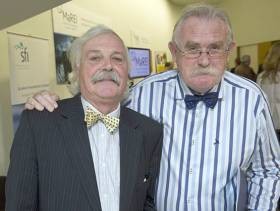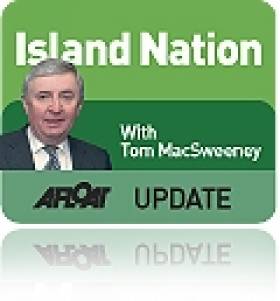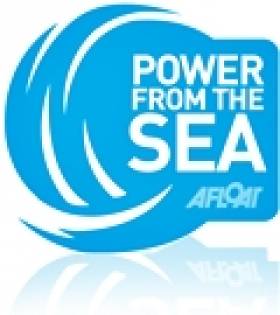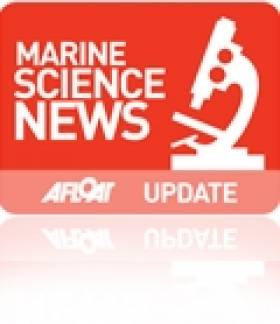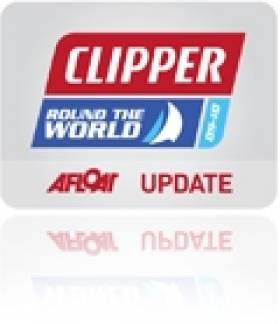Displaying items by tag: University College Cork
Michael O’Suillebhain & University College Cork are “Sailors of the Month (Intervarsity Keelboats)” for March
It’s more than 18 months now since Michael O’Suillebhain did some skilled helming to bring Kinsale YC’s J/24 Kinsailor onto the podium in the J/24 Europeans at Howth. But his skills were as sharp as ever as he led the Kinsale squad to victory in the hard-fought intervarsity Keelboat Championship this Easter weekend at the same venue, even if this time they were racing the host club’s multi-purpose flotilla of J/80s.
The overall memories of the 2023 season are of general recollections of June’s good weather being virtually completely blotted out by the foul conditions that prevailed in July, August and September. But though we went into the 2024 Easter Weekend with mostly pessimistic weather forecasts, things were much better than expected, and University College Cork gallantly led the charge at Howth in making the best of them.
Always having the Friday and Saturday of the last weekend of March as the "fixed fixture" for your annual event is usually guaranteed to provide lively conditions and Howth YC's Scorie Walls's regular yearly staging of the University Keelboats team champs, using the club's flotilla of J/80s, has again been appropriately rewarded in 2024, even if some of the racing had to be sailed with a mandatory reef in the main.
GOING MAD WITH THE COLOURED SAILS
As there was nothing said about restrictions on going mad with the coloured sails up front, the sailing students made full use of the offwind opportunities. And none more so than University College Cork, captained by Michael O'Suillebhain of Kinsale, with the UCC team heading home with the top prize.
 "Sailing off the east coast in the mad March days...." Everything under control at this stage, but it's anybody's guess what might happen if that black squall finlly hits the fleet. Photo: Emmet Dalton
"Sailing off the east coast in the mad March days...." Everything under control at this stage, but it's anybody's guess what might happen if that black squall finlly hits the fleet. Photo: Emmet Dalton
Those who are resident and with a sea view at Howth have become accustomed to seeing the local club-owned J/80s being used for HYC's extensive sail training and introduction afloat programme. And - not to put a tooth in it - in those circumstances, the boats aren't necessarily seen to be looking their best. But all credit to Ireland's student sailors, they were on top of the challenge from the get-go, there was exceptonally close racing throughout, and the J/80s were looking great in these past two days to remind us what a notably handsome little craft we have with this classic J/Boat.
 The "Scorie Walls College Keelboat Champs" provided the opportunity for competent student sailors to demonstrate the J/80 at her handsome best. Photo: Emmet Dalton
The "Scorie Walls College Keelboat Champs" provided the opportunity for competent student sailors to demonstrate the J/80 at her handsome best. Photo: Emmet Dalton
Irish Researchers Contribute to Identifying New Whale Species
Irish whale experts have contributed to the identification of a new species of whale which is so deep diving that it has rarely been recorded before.
A global network of researchers including Prof Emer Rogan of University College Cork/Environmental Research Institute used sophisticated genetic analysis to confirm the identification.
The new type of whale, which was washed up on the New Zealand coast almost a decade ago, is believed to be one of about 1.5 million as yet undiscovered species in the deep ocean.
It has been named Ramari’s beaked whale after Ramari Stewart, a Mātauranga Māori whale expert, while its scientific name, Mesoplodon eueu, refers to its indigenous roots in South Africa.
 The new whale species, Ramari's beaked whale, which Irish researchers helped to identify
The new whale species, Ramari's beaked whale, which Irish researchers helped to identify
Prof Rogan says the identification is exciting on two fronts – the first being confirmation of any new species of marine mammal, and the second being that this particular whale has been given an indigenous name to acknowledge the Maori input in the research.
As Prof Rogan explained, it was originally believed that the mammal washed ashore on the west coast of Te Waipounamu (South Island), Aotearoa New Zealand was a True’s beaked whale.
Named An Míol mór socach breá in Irish, the True’s beaked whale was named after Frederick True, a curator at what is now the US Smithsonian, and some 14 of this type have been recorded on the Irish west coast.
The squid-eating whale has never been hunted, and most knowledge of it comes from stranding records as it can dive thousands of metres to find its prey and spends a lot of time offshore.
However, Ramari Stewart knew there was something different about this whale and contacted biologist Dr Emma Carroll of the University of Auckland.
Prof Rogan and colleagues including Dr Simon Berrow of the Irish Whale and Dolphin Group (IWDG) and Galway-Mayo Institute of Technology were then among a number of researchers asked to provide samples.
“When it was confirmed that this was not a True’s beaked whale, we did establish that it was closely related and may have been separated around two million years ago,”Prof Rogan says.
The discovery brings the total number of beaked whale species to 24, with this new one being indigenous to the southern hemisphere.
“It’s wonderful that a new míol mór species has been discovered and highlights just how little we know about biodiversity in the deep sea,”Prof Rogan said.
“ Deep diving beaked whale species are difficult to study,” she said.
“The work involved a large collaboration of researchers and indigenous practitioners across the globe with the multi-discliplinary nature of the work demonstrating the importance and value of long term cetacean stranding programmes and data collection, along with museum and tissue archives,”she said.
Naming it after Ramari Stewart is also “a fitting tribute to an amazing woman, practised in traditional skills and knowledge, while also highlighting the disappearance of many local languages”, Prof Rogan added.
Dr Emma Carroll and collaborators have published the findings in the international journal Proceedings of the Royal Society.
More here
Seascapes Podcast – Ocean Energy Father Honoured
Hello and welcome aboard this week’s edition of your maritime programme ... this weekend on Saturday and Sunday - Dive Ireland 2016 the Annual conference hosted by the Irish Underwater Council and Athlone Sub Aqua takes place in the Hodson Bay Hotel in Athlone with a panel of experts speaking on a wide range of topics and a large selection of exhibitors showing their wares; also in Galway the Skipper Expo which began earlier today runs until Saturday afternoon in the Galway Bay Hotel in Salthill – Seascapes will be attending both events and hope to meet up with you there...
First on Seascapes this week... to an event held in the maritime hub of Cork Harbour earlier this week – titled the Lewis Symposium the two day event honoured Emeritus Professor Tony Lewis of University College Cork considered to be the father of Ocean Energy in this country ...let’s hear first from Professor Sarah Culloty of University College Cork, Head of School of Biological, Earth and Environmental Sciences and Director- Environmental Research Institute...
Conference: ‘A Safe Place for Ships’: Cork, Ireland, Europe and the Sea
#Conference - 'A Safe Place for Ships': Cork, Ireland, Europe and the Sea is the title of a two-day maritime history conference to be held on 28-29 November in University College Cork.
The free admission conference which requires no registration is to be hosted in UCC's main campus in the Electrical Engineering Building (L‐1). The opening hours are: Friday (1:30pm – 8pm) and on the Saturday (10am – 6pm).
To download a repeat of the conference details which includes a painting of a paddle-steamer heading upriver on the River Lee in Cork city quays, click HERE.
Ireland is an island nation, with a rich maritime heritage and the conference will explore its sea-going past and culture, along with that of its European neighbours.
Among the topics to be discussed are the Vikings, piracy, the Spanish Armada, international trade, the Napoleonic War at sea, island nations, emigration, port cities, Lusitania and WWI submarine warfare.
Speakers include: Prof Eric Grove (Liverpool Hope Univ.); Prof Donnchadh Ó Corráin (UCC); Prof Michelà D'Angelo (Univ. of Messina); Dr Simon Mercieca (Univ. of Malta); Prof Claire Connolly (UCC); Prof Jürgen Elvert (Univ. of Cologne); Dr Susan Flavin (Trinity College Dublin); Dr Connie Kelleher (Nat. Monuments Service/UCC).
Conference was organised by Dr Hiram Morgan ([email protected]) and Dr John Borgonovo ([email protected]), School of History, University College Cork.
Funding for the Cork conference is from the Irish Research Council's New Foundations Scheme with assistance from the Port of Cork Company.
Taking Over Cork Harbour, Seamanship, United Nations & The Sea
#corkharbour – In compiling this month's edition of This Island Nation I met a 23-year-old student from University College, Cork, who told me the story of Soviet-inclined workers of Cork Harbour Board taking over the port and flying the Red Flag over the hallowed building of the Board, then administered by members of the elite and exclusive part of Cork society. It is a fascinating part of Irish history
Ships were prevented from entering the Port of Cork which was then under a blockade of the Red Flag in the Soviet-style take-over.
I thought I knew my history, but never knew about this, nor it seems may many other people, when the Red Flag flew over the board offices and Sinn Fein tried for treason those who had followed the lead of Cork's then Lord Mayor, the legendary Tomás MacCurtain.
Luke Dineen told me the story. He is studying at UCC for his PhD on the history of the labour movement in Cork from 1918 to 1923. I hope you listen to the programme where you will hear about this unusual part of Irish maritime and labour history, with a twist in the tail about Cork's commemoration of its 800th anniversary involving the famous pub, the Phoenix.
There are many other stories in the programme which provides the most widespread coverage of maritime affairs on air.
NAVAL SEAMANSHIP APPRECIATION
It is encouraging to know that a blog like this is so well read and so, when the Naval Service contacted me following my column on July 13 about sailing past their base on Haulbowline aboard Odd Job, the yacht owned by a friend of mine in Monkstown Bay Sailing Club and altering course at the request of the L.E. Samuel Beckett to facilitate it docking at the Base, it was to express appreciation of the seamanship and courtesy involved,
John Hegarty, the Skipper/owner, the rest of the crew aboard and myself are very appreciative of the courtesy of the Navy in the note they sent to invite a visit to the ship "in recognition of the values of good seamanship and courtesy displayed between the two vessels."
I had recounted how John lost the winning position on that night's league racing in Monkstown, the time involved in altering course and then returning to the racing making the difference on handicap.
Why I am writing again about this is to stress the courtesy and seamanship involved between the State vessel and a racing yacht. In this instance it occurred in the confines of a narrow part of Cork Harbour, but seamanship and courtesy are applicable anywhere on the water and, regrettably, there are growing incidents of these values not being shown.
RNLI and Coast Guard contacts have told me of rescue calls, particularly involving engine breakdowns, when help is despatched but those in difficulty manage to get an engine going again, but don't bother to advise the rescue services that they no longer need help and lifeboat or Coast Guard personnel can spend time searching fruitlessly for them.
Then there are the ribs and motorboats which rush past sailing vessels with no consideration for the wash they cause, the yachts which impede commercial traffic in a harbour and the owners of which are under the illusion that "steam gives way to sail," which does not operate inside commercially-operated harbours. There are those who sail at night but show no lights, those who do not obey the speed limits inside harbours and several other aspects which readers could probably quote. All of which show lack of seamanship.
Anyone who takes a boat out on the water has a duty of responsibility not only to those aboard, but to everyone else on the water.
"Seamanship" has been defined in many ways.
One of the best definitions for me was that by Denny Desoutter published in 1978 by Hollis & Carter in his book 'The Boat-Owner's Practical Dictionary' which cost me then £4.50 in pre-Decimalisation and pre-Euro money:
"SEAMANSHIP: The art and science of keeping out of trouble at sea, no matter whether your craft is a fully-rigged ship or a makeshift raft."
That was his definition.
I commend it to all who go afloat.
Denny Desoutter was the founder-editor of Practical Boat Owner magazine in the UK, was also a broadcaster on maritime affairs and wrote technical articles for magazines around the world, as well as being the author of several books.
ATLANTIC AND PACIFIC TOLL
Thirty-three per cent of all hull and machinery claims for damage encountered by ships in heavy weather occur in the Atlantic and Pacific. Of these claims, 48 per cent relate to containerships, 27 per cent bulk carriers and 15 per cent for ro-ro vessels. These figures have been released by the Swedish P&I Club, shipping insurers in a new guide to 'Heavy Weather' which is intended to cut the number of insurance claims. "It provides seafarers with advice on how to avoid the many problems associated with adverse conditions, including check lists about securing cargo, guidance on course and speed and managing ballast conditions in heavy weather," says the company. "Warnings about serious weather are usually available day before the weather arrives, but we see examples of crews not managing to avoid the heavy weather, not slowing own or altering course to avoid large waves pounding the vessel."
UNITED NATIONS AND THE SEA
The United Nations can, at times, seem to be a somewhat toothless organisation, with little effective power and slow to react quickly to issues. It does have within its ambit the International Maritime Organisation, which is responsible for safety at sea and it has now been urged to place the oceans "at the forefront of its development agenda." This comes from the Global Ocean Commission which was established in February of last year. An impressive title and the membership of which is comprised of former heads of state, government officials and business leaders but, noticeably, not a lot of maritime professionals or experience amongst them. However, its first report is a pretty major piece of work about the future of the oceans, calling for the United Nations to lead a five-year rescue plan. This has not received a lot of media coverage, even though its proposals are strong, such as suggesting that there
should be "proper high seas governance," with a new global agreement for the conservation and use of marine species; the appointment of a UN special representative for the oceans to co-ordinate all laws and agreements relating to it; the creation of regional sea management organisations and ocean ministers in each nation which is a member of the United Nations with a sea border. It suggests that such a Minister would have a role across all aspects of Government which relate to any aspect of the oceans"! to create stronger co-ordination between ministries." There is exactly where those concerned about Irish Government neglect of the maritime sphere have pinpointed a major problem. Maritime matters have been dispersed across too many government departments, so that their importance has been diluted. But will Taoiseach Enda Kenny and his government colleagues heed what has been recommended by the Global Ocean Commission? Hardly likely and I wouldn't give much hope that the UN will either!
From time-to-time I hear quite a few remarks from those who think along the lines of Hermann Broch who described "those who live by the sea" as "hardly being able to form a single thought of which the sea would not be part." As a counterbalance to that quote where he failed to understand the sea, I quote President John F.Kennedy, who did understand it and his assessment: "It's because we all came from the sea. And it is a biological fact that all of us have in our veins the same percentage of salt in our blood that exists in the ocean. We are tied to the ocean. And when we go back to the sea - whether it is to sail or to watch it - we are going back from whence we came."
Fair sailing until next week...
Twitter: @Afloatmagazine @Tom MacSweeney
New Marine Energy Lab for Cork Harbour
#POWER FROM THE SEA - A new marine research lab in Cork Harbour could help Ireland to be a global leader in renewable energy, the Irish Examiner reports.
The Beaufort Laboratory, being built on a three-acre site next to the National Maritime College of Ireland on Haulbowline Island, is set to be completed by 2016.
And scientists at the €14 million lab have told Minister for Energy Pat Rabbitte that it will be the largest marine renewable energy research facility in the world.
Expected to be a base for 135 researchers from University College Cork (UCC), the lab also hopes to attract the world's top researchers in marine energy to the area, with an aim to exploiting the potential for jobs in the fast-growing ocean energy sector.
The new lab forms part of the Irish Maritime and Energy Resource Cluster (IMERC) established to promote the country as a world-renowned research and development location, as previously reported on Afloat.ie.
The Irish Examiner has more on the story HERE.
Simon Coveney Appointed Marine Minister
Cork sailor Simon Coveney (38) has been appointed as Minister of Agriculture, Food and Marine in the new cabinet of the Fine Gael/Labour Government formed yesterday.
The announcement has been welcomed by various marine interests pleased to see Marine back at the cabinet for the first time since the Department was dismantled by Fianna Fail's Bertie Ahern in 2002.
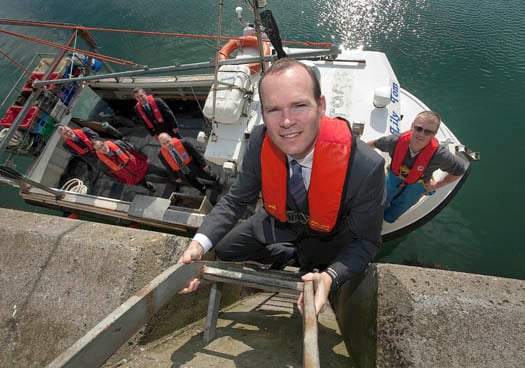
Marine Minister Simon Coveney TD
The appointment means Taoiseach Enda Kenny has kept good an election promise to reinstate the Marine department. A decade of lost opportunties has meant the sector has suffered through lack of infrastructure and coastline planning.
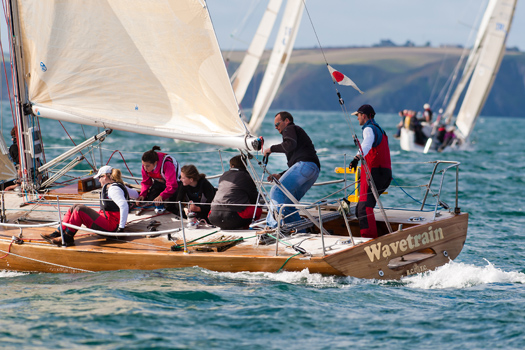
Simon Coveney at the helm of his yacht Wavetrain. Photo: Bob Bateman
"Simon is someone who understands the Sea as a sailor himself but also in his work as an MEP where he was involved in a number of major European maritime projects. This is a great opportuinty for the Marine. We look forward to working with him to develop this untapped resource." said David O'Brien of the Irish Marine Federation.
Simon was first elected to the Dáil in 1998 as one of Fine Gael's youngest TD's aged 26. He replaced his father Hugh Coveney TD following his untimely death.
Simon follows his father in to the post of Marine Minister. Hugh held the post in 1994.
Simon holds a B.Sc. in Agriculture and Land Management from Royal Agriculture College, Gloucestershire. He was also educated at Clongowes Wood College, County Kildare; University College Cork, and Gurteen Agricultural College, County Tipperary.
A keen fan of all competitive sport he has worked as a sailing instructor at his club Royal Cork Yacht Club in Crosshaven and been involved in many sailing regattas.
In 1997/8 he led the "Sail Chernobyl Project" which involved sailing a boat 30,000 miles around the world and raising €650,000 for charity.
In 2006 he contributed to RTE's series The Harbour and in a memorable quote, the Cork TD and former MEP said: "When somebody asks me the question, what's the one thing that's special about Cork?, I'd say the harbour."
Scientists Await Data from Galway Wave Energy Test
The Irish Times reports that a number of European universities and research centres are eagerly awaiting the data from the latest wave energy test buoy deployed in Galway Bay.
Cork company Ocean Energy Ltd is behind the latest test and research platform, co-ordinated by the hydraulics and marine research centre at University College Cork.
The scheme has €4.5 million in funding approved by the EU and commissioner for research and innovation Máire Geoghegan-Quinn.
A recent study for Sustainable Energy Ireland suggests that ocean-derived energy could generate €9 billion in income and thousands of jobs in the next 20 years.
Cork Clipper Brings €5.6m in Economic Return to the Local Economy
An economic impact analysis was carried out by three MBS students from University College Cork (Ger Swayne, Lorcan Daly & Stephen Hicks) which reported an economic impact of €5.6m with accommodation and food and beverage accounting for 65% of the figure. The students worked according to the standard Failte Ireland festival report methodology which includes qualitative and quantitative research.
At today's launch Deputy Mayor Of County Cork Cllr John O Sullivan stated 'the festival gave a great boost to the Kinsale area early in the summer season and it also ensured that works were carried out in the town prior to the event that benefitted both locals and visitors. In particular the refurbishment of the Old Mill as an exhibition venue was a huge new resource for the town.'
The media report was carried out by IFM Sports Marketing Surveys and was commissioned by Clipper Ventures who run the Clipper Round the World Yacht Race. Global media coverage for the whole race is estimated at over $100m and Cork's share of this is very substantial at $26.5m. These figures are boosted by a Discovery Channel global deal that has been agreed with the TV series producers and Clipper Ventures. An Irish broadcaster for the series will be announced in the coming weeks.
Commenting on today's results, Fiona Buckley, Head of Operations, Fáilte Ireland stated 'from a tourism perspective the media coverage that Kinsale, Cork and the region received through the Clipper project will ensure that Cork is top of mind as a tourism destination in the coming years. In addition the economic report found that 98% of the overseas visitors would return to Cork as a result of the Clipper festival and 97% would recommend Cork to their friends.'
The festival in Kinsale was helped by the arrival of the fleet of 10 Clipper yachts six days ahead of schedule and the fantastic weather during that period. When the yachts moved to the new Port of Cork Marina on 07 July the weather changed dramatically and this had an impact on the attendance figures in the city.
'When the fleet arrived in Cork city there was a crowd of over 10,000 people to welcome the fleet to the new Cork City Marina which was installed to welcome the Race but is also a lasting legacy to marine tourism in the region. We would like to thank the Port of Cork for investing in this new permanent infrastructure with the support of Cork City Council.
This new Marina will play host to other marine events over the coming years.' Stated Lord Mayor Cllr Michael O Connell Clipper Race Chairman, Sir Robin Knox-Johnston, said, "Cork and Kinsale were fantastic hosts, providing marvellous entertainment during
the race festivals in both locations and I am pleased to see that they reaped the rewards. The welcome visitors received will ensure a lasting tourism legacy for years to come. "
The return on investment for the project is estimated at over 300% which is above average for hosting a sporting event of this calibre.


























